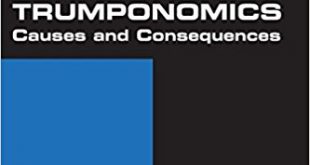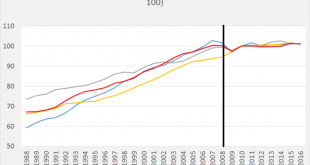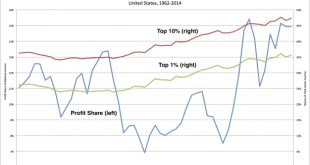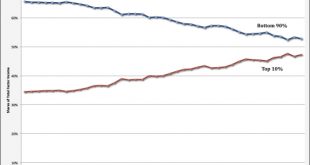paperback now available from the Amazon pages listed below 508 pages Here are links to the book’s pages on the various AmazonsUnited States $28, Brazil, Canada, France, Germany, India, Italy, Japan, Mexico, Spain, United Kingdom
Read More »The counterintuitive problem
from Edward Fullbrook Scientific education entails taming the authority of one’s intuition. Responsible citizenship in a democracy may entail it as well. Keynes argued that markets often create inaccurate expectations of economic reality which people then act upon thereby changing reality. This reflexivity that Keynes identified as central to capitalist markets is the opposite of the basic process described by traditional economic theory, both in Keynes’ day and in our own, whereby it...
Read More »Solow being uncomfortable with ‘modern’ macroeconomics
from Lars Syll So in what sense is this “dynamic stochastic general equilibrium” model firmly grounded in the principles of economic theory? I do not want to be misunderstood. Friends have reminded me that much of the effort of “modern macro” goes into the incorporation of important deviations from the Panglossian assumptions that underlie the simplistic application of the Ramsey model to positive macroeconomics. Research focuses on the implications of wage and price stickiness, gaps and...
Read More »Going private: the Trump administration’s big infrastructure plan
from Dean Baker The Trump administration’s “infrastructure week” ended whatever hope any of us had that something positive could come out of this administration. It’s clear that his promise for rebuilding the country’s infrastructure is just another Trump scam. During his campaign, Trump had made a point of complaining about the poor state of the country’s infrastructure. He had a point, as both the federal and state and local governments have cut back spending in recent years. In the...
Read More »The productivity stagnation – not a global phenomenon.
Long story short: labor productivity, as economists define it, is best understood as the amount of ‘stuff’ the income (wages, profits, rents, interest) related to one hour of work can buy (this is a somewhat idiosyncratic take on productivity. Look however here). Productivity is, as economists define it, not any kind of physical entity. It is supposed to be ‘value added’, or total income cq. the nominal value of net production, per hour of work. For about two centuries, give or take some...
Read More »Capital’s rising shares
from David Ruccio Recently, I showed that conventional thinking about factor shares has been finally overturned: they are not necessarily constant, especially within existing economic institutions. In fact, labor’s shares have been declining for decades now. The opposite is true of capital’s shares: they’ve been rising for almost three decades. The profit share of national income has, of course, a cyclical (short-term) component. It falls in the period preceding each recession, and...
Read More »Economics textbooks transmogrifying truth — wages and unemployment
from Lars Syll A couple of weeks ago yours truly was sent a copy of the new edition of Chad Jones intermediate textbook Macroeconomics (4th ed, W W Norton, 2018). There’s much in the book I like, e. g. Jones’ combining of more traditional short-run macroeconomic analysis with an accessible coverage of the Romer model — the foundation of modern growth theory — and DSGE business cycle models. Unfortunately it also contains some utter nonsense! In chapter 7 — on “The Labor Market, Wages, and...
Read More »The evidence does not support Macron’s claim that deregulating labor market will boost economy
from Dean Baker In her Washington Post column, Catherine Rampell repeats some ill-founded conventional wisdom in telling readers that French president Emmanuel Macron’s plans to weaken labor unions and reduce restrictions on laying off workers are the path to revitalizing France’s economy. In fact, this claim is not supported by the evidence. There is little evidence that strong unions or labor market protections are associated with high unemployment. The most obvious reason that France...
Read More »‘Cauchy logic’ in economics
from Lars Syll What is 0.999 …, really? Is it 1? Or is it some number infinitesimally less than 1? The right answer is to unmask the question. What is 0.999 …, really? It appears to refer to a kind of sum: .9 + + 0.09 + 0.009 + 0.0009 + … But what does that mean? That pesky ellipsis is the real problem. There can be no controversy about what it means to add up two, or three, or a hundred numbers. But infinitely many? That’s a different story. In the real world, you can never have...
Read More »Pulling away
from David Ruccio Apparently, Richard Reeves is worried that the top echelons of the U.S. middle class—those earning over $120,000—are separating from the rest of the country, and pulling up the drawbridge behind them. “The upper middle class families have become greenhouses for the cultivation of human capital. Children raised in them are on a different track to ordinary Americans, right from the very beginning,” he writes. The upper middle class are “opportunity hoarding” – making it...
Read More » Real-World Economics Review
Real-World Economics Review







